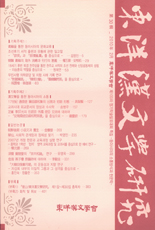- 영문명
- Interpretation of
Sangseo understanded in the Joseon Period from the Perspective of Political Economics - 발행기관
- 동양한문학회(구 부산한문학회)
- 저자명
- 유영옥(Yu, Young-Og)
- 간행물 정보
- 『동양한문학연구』東洋漢文學硏究 第37輯, 119~149쪽, 전체 30쪽
- 주제분류
- 어문학 > 한국어와문학
- 파일형태
- 발행일자
- 2013.08.31
6,400원
구매일시로부터 72시간 이내에 다운로드 가능합니다.
이 학술논문 정보는 (주)교보문고와 각 발행기관 사이에 저작물 이용 계약이 체결된 것으로, 교보문고를 통해 제공되고 있습니다.

국문 초록
『상서』는 上古 聖賢의 昌言盛事를 기록하여 일찍부터 治國에 종요로웠지만, 분분한 진위논변에다 經文 곳곳이 難讀處라 접근하기 매우 어려운 史書이자 경전이다. 그 때문에 현행 우리의 尙書學 연구도 아직은 지극히 일천하여 『상서』 연구의 필요성이 무엇보다 절실하다.
『상서』는 여느 儒經과는 달리 총 58편 중 <우공>과 같은 몇몇 편은 그 가치를 제대로 평가받지 못한다. <우공>은 정치의 핵심원리인 德治를 곧바로 운위하지 않았기 때문이다, 그러나 <우공>은 山川地理書이자 稅法書이므로 德治와 절대 무관하지 않다. 地理와 그에 기반한 稅政은 德治를 구가하기 위한 필수 전제요건이기 때문이다.
<우공>은 大禹가 治水에 성공하여 중국을 9州로 나누고, 각 지역의 土品에 따라 貢賦를 부과하며, 5服제도를 두어 제후를 분봉하여, 天子의 聲敎를 온 세상에 미치게 한 위대한 功業의 기록이다. 大禹의 王業이 여기에서 비롯되어 <우공>편이 「夏書」의 첫머리가 되었고, 군주의 실질적인 통치사업을 보여주기 때문에 孔子는 <우공>을 '觀事'의 글이라 하였다.
<우공>의 貢[貢物]과 賦[田稅]는 '任土作貢'에 의해 부과된다. 임토작공은 각 지역의 토지 생산성에 맞추어 貢賦를 부과하는 원칙으로, 고대 聖王의 제도요 後世가 추구해야 할 이상정치의 구체적인 실천 방안이다.
『상서』 <우공>에 내재된 임토작공의 원칙은 세종조 貢法 창안에 결정적인 역할을 하여 조선시대 田稅 정책의 근간이 되었다. 또 조선 국초부터 大同法 시행 이전까지는 貢物 부과의 원칙으로도 당연히 수렴되었다. 따라서 <우공>은 실질적인 經世 측면에서 『상서』의 어느 편보다 조선의 國政과 긴밀히 연관되어 그 가치가 결코 적지 않다.
본고는 여기에서 연구주제를 포착하여, 「우공」의 「하서」 수록 배경과 '觀事'의 내용을 요약하고, <우공>이 조선시대에 어떻게 인식되고 활용되었는가를 살펴, 『상서』 <우공>의 의미와 가치를 재발견하고자 했다. 그로 인해 향후 『상서』 연구의 활성화 및 연구방향의 다양화도 아울러 촉구하고자 노력하였다.
영문 초록
Throughout its all 58 chapters, Sangseo suggests that ruling with virtue is the most critical principle of politics. Among those chapters, is a provision of geographical information on one hand, but guidelines for tax laws{taxation] on the other hand. It has no apparent message regarding ruling with virtue. For this reason, is often considered less important. But since it deals with national territory and geography and tax policy all of which may be basic elements of virtuous ruling, however, is even more important than any other chapters of Sangseo from the perspective of the political reality.
is a sort of records that after controlling floods successfully, Wu divided the entire territory into 9 provinces and levied 'Gong'[land tax] and 'Bu'[tributes: native produce] depending on the land productivity of each of the provinces and these moves contributed to making him the Son of Heaven. Thus, allows inspecting very great acts of the state by the emperor[Gwansa].
According to , Gong and Bu have to be levied depending on land productivity. This principle was named 'Imtojakgong'. As the very basis of Joseon's land tax policy, Imtojakgong played a decisive role in the creation of Gongbeop in the reign of King Sejong. It was the most dominant principle of tribute collection throughout the Joseon period.
But that principle was gradually faded away as Daedongbeop began to be enacted and implemented in the late Joseon period. Daedongbeop provided that local regions offer rice, hemp cloth or money as tributes to the state, instead of their native produce. The act played an epoch-making role in converting the medieval national collection system into the modern one. Accordingly, however, Imtojakgong, or the principle of taxation depending on land productivity became meaningless and invaluable. In addition, th meaning and value of which was underlying by that principle were deteriorated.
목차
국문초록
Ⅰ. 머리말
Ⅱ. <우공>의 편제와 내용
Ⅲ. <우공>의 任土作貢
Ⅳ. 맺음말
참고문헌
Abstract
해당간행물 수록 논문
참고문헌
관련논문
어문학 > 한국어와문학분야 BEST
더보기어문학 > 한국어와문학분야 NEW
- 한국어 교육을 위한 간접인용문에서의 인용동사 시제 선택 - 형식적 요인과 화자 요인을 중심으로
- 전승 한자음에서의 설·치음 뒤 j계 상향이중모음의 단모음화 과정 연구 - 『왜어유해』·『아학편』·『국한회어』 분석을 중심으로
- 일제강점기 웅변서적 연구 - 유형별 검토 및 사회적·교육적 함의를 중심으로
최근 이용한 논문
교보eBook 첫 방문을 환영 합니다!

신규가입 혜택 지급이 완료 되었습니다.
바로 사용 가능한 교보e캐시 1,000원 (유효기간 7일)
지금 바로 교보eBook의 다양한 콘텐츠를 이용해 보세요!



